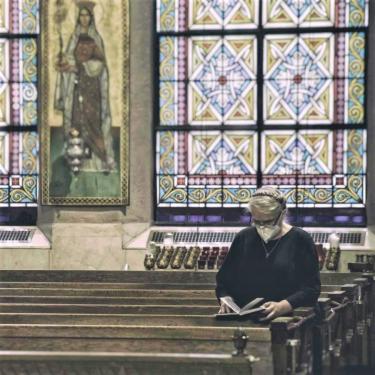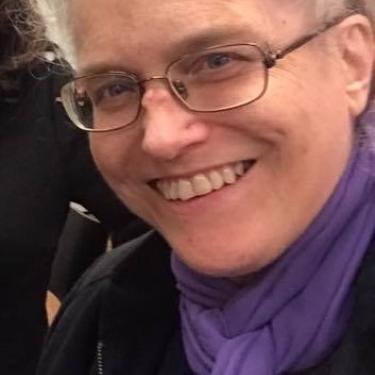
Our last Woman of the Week this year is Dawn Helene. As her nominator writes, “Dawn is the Dino Anagnost Artist-in-Residence at the Greek Orthodox Archdiocesan Cathedral of the Holy Trinity in New York City, the national Cathedral of the GOAA. In this volunteer role, Dawn is responsible for arranging an ever-growing body of work for the choir in both the English and Greek languages, many of which are heard during the weekly Divine Liturgy…. Although she became Orthodox later in life (she originally embraced the Lutheran tradition), she has become proficient in the Byzantine tones in a relatively short time, and is immensely respected for her talents and service to the Church” as associate chanter for the Cathedral. (You see her here celebrating a birthday with her conversion cohort.) We asked her to tell you how she became not only Orthodox, but also a chanter:
“It would have been easy to remain a Lutheran. The congregation my son and I belonged to was everything I had ever hoped to find in a church, and I was grateful to God for leading me there. There were so many ways to serve: singing in the choir, chanting, serving as lector, crucifer, thurifer, even subdeacon, and my son had dozens of “grandparents”, “aunts”, and “uncles” as well as a couple of friends around his age. But then one day it became clear that we needed to find a church with more kids. While some Lutheran churches have figured out how to minister to families, and others have gotten really good at worship, I’ve never found one that has figured out how to do both. Off we went, therefore, to the Episcopalians, who (at least in New York City) have big-tent churches that manage to be more things to more people.
“For my son there was a thriving youth program, and for me there was magnificent music that regularly brought me to tears with its beauty. There were classes led by learned and faithful laypeople; it was the perfect place to be on sabbatical, to sit in the pew and be fed by the service of others. Eventually I found my way into the music ministry, joining one of the choirs and adding the Anglican choral tradition to the hymns and anthems of my youth.
“Then a woman whose daughter was the same age as my son (they were often mistaken for siblings) invited me to join a class she was in. It met one evening a week for four years, reading Old Testament the first year, New Testament the second, church history the third, and modern theology the fourth. This was a group of people who were seeking God, studying the Scriptures, and listening for the still, small voice of the Spirit. More than one of my classmates ended up going to seminary when the class was finished. But I wasn’t called to ordained ministry. Instead, during the church history year, I started feeling a little tug of curiosity about the early church and the Patristic period. Eventually I found myself sitting in a pew at the Greek Orthodox Cathedral in Manhattan.
“Here was a banquet the likes of which I had never seen. There was a liturgy book in the pew rack with Greek and English on facing pages, so I could follow along and begin decoding the Greek words. Every week something new would leap off the page and start rearranging the spiritual furniture inside me. The priest was humble, kind, and prayerful, absolutely aglow with love for God and His people. With my son grown up, I was free to follow this new path, joining the choir, studying, and preparing for chrismation.
“Bit by bit I learned the liturgy, and eventually started to study Byzantine chant. The choir sang wonderful liturgical music, by Bogdanos, Zes, Gallos, and Anagnost. But some of the pieces we sang regularly were simple unison or two-part arrangements, with women’s parts that were too high for my second-alto voice, and finally it occurred to me that if we were ever going to have proper alto parts for some of these hymns I was going to have to write them myself. Though I have a master’s degree in music, choral arranging was not something I had ever studied, or had the slightest impulse to do. So I can only give thanks to God that along with the desire to write something came the ability. It is the privilege of my life to have an opportunity to join the myriad of musicians over the centuries who have made contributions to the beauty of Orthodox worship. It would have been easy to remain a Lutheran, but I’m grateful to God who had a better idea. Glory to God in the highest!”
Axia!
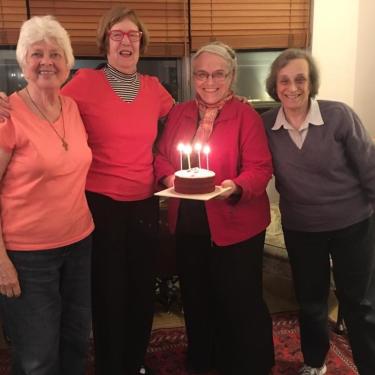
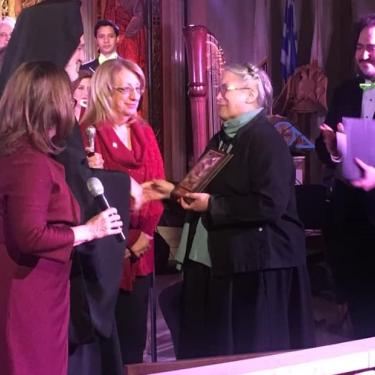
Dawn Helene is our last Woman of the Week for 2021. You see her here receiving the Dino Anagnost Artist-in-Residence Award from Archbishop Elpidophoros, chanting during a service, and standing among her chanting brethren at the Cathedral. She was nominated for her work as Artist-in-Residence at the Greek Cathedral in Manhattan. We asked her what that has been like:
“What is it to be the Artist-in-Residence? Mostly it means that I am encouraged to continue writing choral arrangements for use in the Divine Liturgy and for concerts. The Archdiocesan Cathedral Choir has been unbelievably supportive, and I am mindful of the fact that many a composer toils away in solitude, with no guarantee that their work will ever be heard. More than that, I have the luxury of writing for a choir that has professional singers on every voice part, along with volunteers from the congregation. There is nothing I’ve ever written or wanted to write that they couldn’t sing.
“As to the process, it is highly collaborative, with the choir director and I meeting regularly to approve completed pieces, and to set priorities and timelines for what should come next. Once we’ve decided what the targets are, the fun begins. I sit down at my keyboard at home and write out the melody for the selected hymn. Then comes the mysterious bit. As I play through the melody, at some point I begin to hear which chords belong with a particular part of the tune. Then I play with the voicing, assigning different notes in the chord to each voice part, trying to ensure that each chord works on its own and that each voice part moves smoothly from one chord to the next. Sometimes the ending of the piece comes together first, sometimes I go straight through from the beginning. Certain pieces come so fast I can hardly keep up, as if they were just waiting for their chance to get out into the world. Others come in fits and starts, one phrase at a time. It’s a combination of inspiration and decision, trial and error, until I love what I’m hearing and am excited to share it.
“The next step is the least glamorous of the lot. My handwritten manuscript is of no use to anyone but me. It has to be entered into the music publishing software so that other people can read it. This is tedious work, but necessary. When all the notes and rhythms are in their proper places, the lyrics can be added. There is a wonderful gentleman, one of our tenors, who takes that raw material and glams it up, adding the proper diacritical marks to the Greek text, breath marks for the singers, etc. Most of my pieces are available in both Greek and English, so he and I, and sometimes the director, work together to make sure both versions work well, with all the accents on the right syllables.
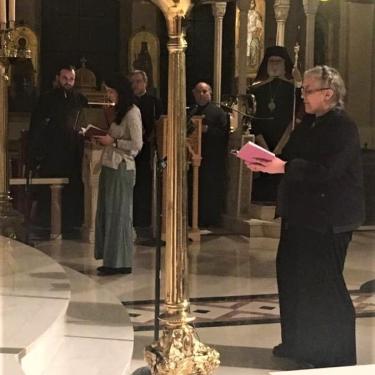
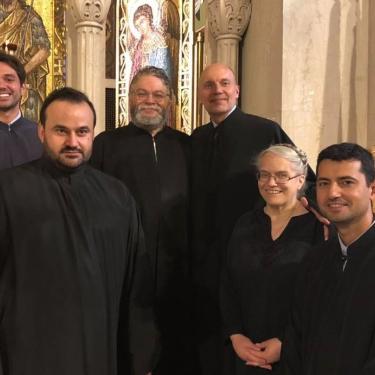
“Once the piece is ready, it’s printed out and added to the choir folders. Sometimes the director will send out the score and an audio file via email, so members can learn it ahead of the rehearsal on Sunday morning. There really is such a number of people involved in bringing any piece to the point where anyone can actually hear it, I can’t help but be grateful for the team that helps with each part of the process.
“At last, the choir is robed and standing in the choir loft, ready for the liturgy to begin. I’m at the organ, and the director gives us our cue. Now we get to turn all that preparation into prayer. The entire point of all the effort that brings us to this moment is for us to sing praise to God, and to assist God’s people in their prayers. There is nothing more satisfying than the end of a piece, when the air is still ringing with the sound of the last chord, and there is a feeling that each of us has given it our all. What a blessing to be able to ‘Sing to the Lord a new song!’”
Our Woman of the Week is Dawn Helene, Artist-in-Residence at the Greek Cathedral in Manhattan. As always, we asked her about her morning routine:
“Recently I came across a new (to me, anyway) German word: Morgenmuffel. It refers to a person who is grumpy in the mornings and doesn’t like to wake up early. That’s me in a nutshell. As a result, my morning routine is streamlined to allow for as much sleep and as little preparation for the day as humanly possible. Brush the teeth, comb and braid the hair, water the palm that Father gave me to take home after Palm Sunday a few years ago, grab some breakfast while perusing the New York Times, that’s pretty much it.
“I would much rather tell you about faithfully sticking to my prayer rule, and if we had had this conversation during the first four months or so after Father gave it to me, I could have pulled that off. But the truth is that I hit a snag with the prayer rule, and I’ve learned the hard way that the most spiritually dangerous thing I can ever do is to put up a front and pretend I’ve got everything under control. I have an icon corner of sorts. There aren’t very many icons, and they’re not all hung up properly. I haven’t got one of those cool hanging lamps. But I do have the Bridegroom and a Dormition icon (my hands-down favorites), and a vial of holy water. Sometimes I manage a sip and a Kyrie eleison. Sometimes it’s a Jesus Prayer, or a “Most Holy Theotokos, save us.” Sometimes it’s the Lord’s Prayer, or even a whole Trisagion. When I can’t do any of that, I try to remember that the Son of the living God came into the world to save sinners, of whom I am the first. May God forgive me, and grant me grace to do His will. Amen.”
Thank you, Dawn!
